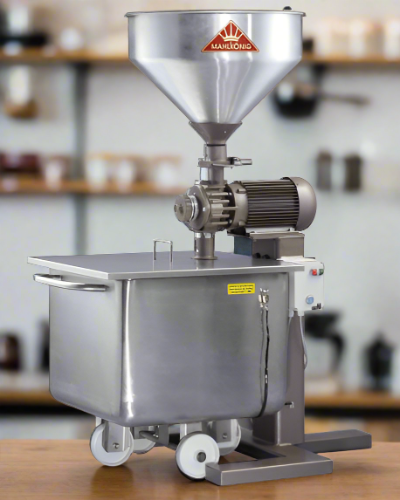A Starter's Guide to Industrial Coffee Grinder Choices
A Starter's Guide to Industrial Coffee Grinder Choices
Blog Article
Industrial Coffee Grinder Guide: Boost Effectiveness and Top Quality
In the affordable landscape of coffee manufacturing, selecting the best industrial coffee grinder plays a critical function in improving both effectiveness and product quality. Comprehending the nuances of various mill types and key functions-- such as personalized work setups and durable building-- can considerably influence the final flavor profile of the coffee.
Comprehending Grinder Kinds
When picking an industrial coffee grinder, comprehending the numerous kinds available is critical for optimizing both flavor removal and operational effectiveness. The two primary sorts of mills are blade grinders and burr mills. Blade grinders make use of sharp blades that slice coffee beans right into inconsistent dimensions, resulting in uneven extraction and potentially unwanted flavors. While blade grinders are typically extra cost effective and suitable for small operations, they are normally not advised for industrial usage.

Inevitably, picking the ideal sort of mill is important to keeping quality and effectiveness in coffee manufacturing, making it essential for businesses to purchase premium burr mills for optimum outcomes.
Trick Features to Consider
Picking an industrial coffee mill calls for cautious factor to consider of a number of essential functions that can dramatically affect both performance and the total coffee experience. Among the primary aspects to assess is the grinding mechanism. Burr mills are typically liked over blade mills, as they offer a regular grind size, which is crucial for optimal removal and taste.
One more essential feature is the grinder's capability. A functional grinder with several setups enables you to tailor the work dimension to various developing methods, improving the coffee's taste profile.
The construction material likewise contributes in sturdiness and maintenance. Stainless steel elements often provide durability and are much easier to cleanse, which is vital for maintaining hygiene criteria. Lastly, review the mill's sound degree, especially in an active café or manufacturing environment, where extreme noise can be disruptive. Purchasing a grinder that balances these functions can substantially improve both functional efficiency and the quality of the coffee offered.
Optimizing Grinding Process
To attain the very best outcomes in coffee preparation, optimizing the grinding process is essential. The grind size substantially affects removal, taste, and overall high quality of the made coffee. Various brewing techniques call for specific grind dimensions; as an example, coffee requires a great work, while French press necessitates a crude structure. Recognizing the relationship between grind dimension and brewing method is the initial step in optimization.


Additionally, keeping track of the grinding rate can maximize the procedure. Slower grinding often generates much less warmth, protecting fragile tastes and aromas. On the other hand, faster grinding may produce too much heat, negatively influencing the coffee's top quality.
Upkeep and Treatment Tips
Proper upkeep and treatment of industrial coffee grinders are crucial for guaranteeing optimal efficiency and durability. Routine cleaning is the structure of upkeep; deposit accumulation can influence taste and grinding effectiveness. It is recommended to clean up the mill after each use, cleaning down the exterior and removing any kind of coffee premises from the burrs.
Furthermore, check the grinding burrs for deterioration. Dull burrs can compromise grind consistency, so they need to be changed as required. Industrial Coffee Grinder. Periodically calibrating the mill is likewise crucial, as this preserves the wanted work size for numerous brewing methods
Lubrication of relocating parts must be done according to the producer's specifications, as this minimizes friction and lengthens the life of the devices. It is vital to utilize food-grade lubricants to make certain security and conformity with health regulations.
Lastly, maintain the mill in a dry see this here and secure environment to stop rust and corrosion. By sticking to these maintenance and treatment suggestions, drivers can enhance the efficiency of their industrial coffee grinders while ensuring high-grade output and extended functional life.
Roi Evaluation
Reviewing the roi (ROI) for industrial coffee grinders is vital for organizations seeking to enhance their coffee manufacturing capacities. A complete ROI evaluation helps establish the economic stability of purchasing top quality grinders, permitting businesses to weigh the initial expenses versus potential gains.
To perform a thorough ROI evaluation, organizations should think about numerous vital variables. Initially, analyze the acquisition cost of the mill, consisting of setup and any type of needed adjustments to existing infrastructure. Next, compute functional expenses, including energy intake, upkeep costs, and labor efficiency improvements. High-performance mills usually bring about minimized grinding time and enhanced throughput, which can considerably enhance performance.
Additionally, take into consideration the effect on product high quality. Industrial Coffee Grinder. Superior grinders generate a more regular have a peek here grind dimension, which can boost flavor accounts and client complete satisfaction, ultimately driving sales. By enhancing the high quality of the end product, companies can warrant greater pricing, resulting in raised earnings
Conclusion
In recap, a commercial coffee mill plays a crucial duty in boosting both effectiveness and item quality within coffee manufacturing. Ultimately, the critical financial investment in a reliable grinder adds dramatically to improved revenue and competition in the coffee sector.
In the competitive landscape of coffee production, choosing the ideal industrial coffee grinder plays a crucial duty in improving both effectiveness and product high quality. The 2 primary types of grinders are blade mills and burr mills. Within the burr grinder classification, there are level burr mills and conelike burr grinders, each with its advantages. Burr grinders are usually liked over blade mills, as they offer a consistent work size, which is important for optimal removal and taste.
In summary, a commercial coffee grinder plays a pivotal duty in enhancing both efficiency and item quality within coffee manufacturing.
Report this page